
Each year the Human Rights Institute recognizes students who have demonstrated exceptional dedication to human rights at Columbia Law School and to the human rights field by awarding this commendation. Honorees are selected based on their commitment to advancing human rights opportunities at Columbia, engagement in mentorship of new students into human rights, activities undertaken in and out of the law school to advance human rights, and commitment to a career in human rights and to advancing the human rights field. Awardees are selected by Human Rights Institute faculty directors and staff.
2022 |2021 | 2020 | 2019 | 2018 | 2017 | 2016 | 2015
2022 Award Recipients
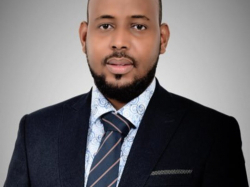
Abdullahi Hassan ‘22 LL.M. is a Kenyan lawyer and a human rights researcher and advocate. Abdullahi was an LL.M. Human Rights Fellow, a human rights clinic student, and a recipient of the Jane Marks Murphy Prize. At Columbia Law school, Abdullahi contributed to several panel discussions about his work with Amnesty International as their Conflict and Somalia researcher. There, he carried out complex research into various human rights topics including the impact of US drone strikes on civilians, violations of freedom of expression as well as the impact of COVID-19 on Somalia’s healthcare system. Abdullahi previously worked for several years in the Africa Division of Human Rights Watch and holds a Bachelor of Laws degree from the University of Nairobi.
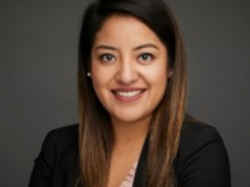
Anahi Mendoza ‘22 J.D. came to Columbia Law with a deep interest in advancing immigrants’ rights having founded a non-profit organization dedicated to providing deportation defense services in California. As a 1L, Anahi participated in the Asylum and Refugee Moot Court and spent her summer working on voting and immigrants' rights cases at the Mexican American Legal Defense and Education Fund (MALDEF). During her 2L year, she joined the Immigrants' Rights Clinic where she represented an Egyptian asylum seeker and individuals detained at the Irwin County Detention Center in Georgia. That summer, she also joined Neufeld Scheck & Brustin where she worked to advance the rights of those who have been wrongfully convicted via 1983 litigation. Anahi went on to serve as the Editor-in-Chief of Volume 53 of the Columbia Human Rights Law Review dedicated to publishing legal analysis and discussion of civil liberties and human rights under both international and domestic law. After graduation, Anahi will clerk on the U.S. Court of Appeals for the First Circuit.
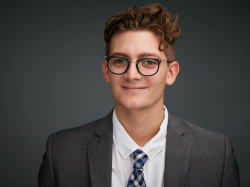
Brandon Vines ’22 J.D. focuses on challenging wrongful state violence domestically and internationally with a particular emphasis on open-source investigation. At CLS, he participated in the 1L Advocates Program, served as a 1L assistant to the Human Rights Clinic, and spent his 2L year working on the Clinic’s Central African Republic war crimes accountability project. Brandon has also served as the coach of the Immigrant and Refugee Rights Moot Court, Executive Articles Editor of the Columbia Human Rights Law Review and Jailhouse Lawyer’s Manual, co-president of Columbia Law School Public Defenders, the Rightslink board, and board president of the Public Interest Law Foundation. He has also supported post-conflict truth-finding in the Central African Republic as a member of the Human Rights Clinic. For his 1L summer, Brandon was a Stevens Fellow with the Federal Defenders for the Middle District of Alabama. He spent the first half of his 2L summer as a capital intern with the Georgia Resource Center and the second half with WITNESS. During his 3L year, Brandon joined the WITNESS Policing Project as a legal fellow. Brandon is an inaugural Public Interest / Public Service Fellow, Racial and Social Justice Fellow, Academic Scholar Fellow, and James Kent Scholar. Following graduation, he will join Human Rights Watch as the incoming Leonard H. Sandler Fellow.
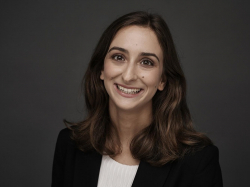
Dimitra Karakioulaki ‘22 LL.M. completed her undergraduate law studies at Aristotle University of Thessaloniki (AUTH) and Heidelberg University (Erasmus student) and she holds an LL.M. degree in Business Law from the National and Kapodistrian University of Athens, where she studied as a Konrad Adenauer Stiftung Scholar. During her studies at CLS, Dimitra served as a Research Assistant at the Human Rights Institute, working on projects concerning the decolonization of human rights and the nexus between justice, human rights, and peacebuilding. She also worked for the TrialWatch project, focusing on LGBTQ+ issues. Additionally, she served as a Policy Fellow at Accountability Counsel, assisting the efforts of the Organization to enhance access to justice for people harmed by internationally financed projects. She also worked as a Researcher for the Commission of Inquiry for Cambodia, where she focused on extrajudicial killings and rule of law issues. She has recently been involved in a project concerning investigations and fact-finding in Ukraine.
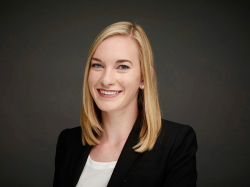
Elizabeth (Liz) White ’22 J.D. has dedicated her time at law school to the study of international criminal law. In her final year of law school, Liz earned an LL.M. in International Criminal Law at the University of Amsterdam, and authored her master’s thesis on the need for increased standardization in the use of user-generated open-source evidence in international criminal investigations. At CLS, Liz was the Head Notes Editor of the Columbia Journal of Transnational Law and published her note on the digitization of international criminal law in the wake of COVID-19. She also served as a teaching assistant to Professor Lori Damrosch’s International Law course and as a research assistant to Anjli Parrin, developing a fact-finding manual for use in international investigations. She was a member of the European Law Moot Court team, on the Professional Development Committee of the Columbia Society for International Law, and on the Research Committee of Rightslink. During her 1L summer, she interned with the Office of the Prosecutor of the International Residual Mechanism for Criminal Tribunals. Liz received the Parker School Recognition of Achievement in International Law and was a Harlan Fiske Stone Scholar. After graduation, Liz will return to work at Debevoise & Plimpton LLP, with a focus on international disputes resolution.
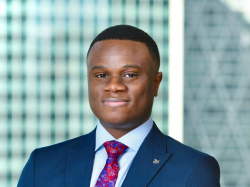
Hillary Obinna Maduka ’21 LL.M. was a Human Rights Fellow, a Harlan Fiske Stone Scholar, a Baker Mckenzie scholarship recipient, and a Parker School Certificate for Achievement in International Law awardee. As a member of the Human Rights Clinic he worked in the Bringing Human Rights Home - U.S. Project team to advance the rights of rural communities to adequate and affordable sanitation. Within the CLS community, Hillary received the Davis Polk Leadership Initiative award, which offered him a grant to bring experienced human rights attorneys and activists who have dedicated their lives and careers to leading positive change and have attained excellence over time, to share anecdotes from their experiences with students and discuss critical but nuanced aspects of a law career that are essential for success as a human rights or public interest attorney.
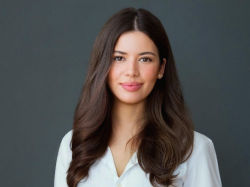
Inès Aurore Zamouri ‘22 LL.M. is a French and Tunisian human rights and social justice advocate. At Columbia, she focused on issues related to criminal justice, women’s rights, and racial justice. She was on the Research Committee at Rightslink, where she connected the CLS community with pro bono research opportunities related to human rights, did outreach to NGOs, and set up research projects. Inès sat on the Board of First Generation Professionals, supporting and advocating on behalf of first-generation and low-income students, especially those looking into the public interest sector. She externed at the Center for Popular Democracy where she worked on several progressive campaigns to end the school-to-prison-and-deportation pipelines. Inès presented her academic research work at the CLS Human Rights Symposium. Inès is graduating as a James Kent Scholar.
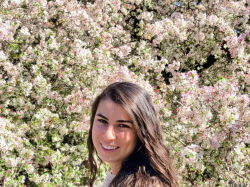
Raisa Elhadi ‘22 J.D. has engaged in human rights work across various practice areas and geographic locations both before and during law school, including teaching refugees in Beirut, Lebanon, working on advocacy to free Palestine and against the continued incarceration of prisoners at Guantanamo at the Center for Constitutional Rights, and, most recently, capital defense work with Phillips Black as a Pro Bono Scholar. After law school, she will combine these experiences and passions to work with capital clients in the Middle East through a fellowship at Reprieve.
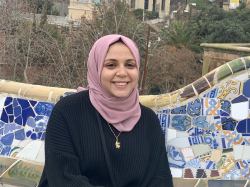
Rawda Fawaz '22 J.D. entered Columbia Law School as a 1L Human Rights Advocates Fellow, and has devoted most of her time at Columbia working on advancing human rights and socio-economic justice both domestically and internationally. Rawda has worked with the Human Rights Clinic for the entirety of her time in law school. As a 1L, she was a research assistant with the clinic's project on disparities in accessing higher education in Kashmir. During her 2L year, she rejoined the Kashmir project, and worked closely with partners to advance research and advocacy for the right to higher education. As a 3L, she helped supervise the Kashmir project, and also joined the Mass Graves team in the clinic, participating in forensic and data analysis for mass graves investigations. During her time in law school, Rawda was also co-president of Rightslink and the Muslim Law Students Association, and president of Columbia Law Students for Palestine. She was also a staff editor on the Human Rights Law Review and Jailhouse Lawyers Manual, and a member of the European Law Moot Court. Rawda served as a student caseworker with the International Refugee Assistance project for 3 years focusing on an ongoing refugee resettlement case. Rawda interned with Human Rights First and the Texas Defender Service her 1L summer and with Debevoise and Plimpton her 2L summer where she focused on International Dispute Resolution. She is also a Harlan Fiske Stone Scholar, and a 2022 winner of the Jane Marks Murphy Prize.
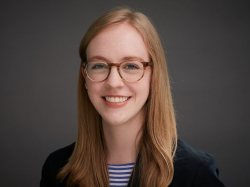
Ray Gdula ’22 J.D. arrived at Columbia Law School committed to pursuing a public interest career. Ray was involved in the Human Rights Clinic for their entire time at Columbia Law School, first as a research assistant and later as a student advocate. While in the clinic, Ray worked with Yemeni partners at Mwatana for Human Rights to conduct UN advocacy on economic, social, and cultural rights violations during the conflict in Yemen and led a workshop to expand Mwatana’s capacity to investigate violations of the right to food. They also developed an interview guide for Mwatana’s field researchers on collecting evidence of right to food violations and drafted educational materials on transitional justice for Yemeni community groups. As a legal intern at Oxfam America, Ray devised advocacy strategies to hold corporations accountable for land grabs in South America. Additionally, Ray advanced human rights within the Columbia Law School community by creating the Preferred Name Guide, which future law students will be able to use to ensure that their peers and professors address them by their preferred names. Ray was also a Managing Editor of the Columbia Human Rights Law Review and a Harlan Fiske Stone Scholar. After graduation, Ray will join the New York State Offices of the Inspector General as an Excelsior Fellow.
2021 Award Recipients
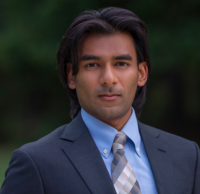
While at Columbia Law School, Adi Radhakrishnan ’21 J.D. committed significant time to strengthening human rights and social justice, with a focus on global health. He was a Human Rights Institute 1L Advocate, professional development chair for the South Asian Law Students Association, a notes editor for the Columbia Human Rights Law Review, a competitor-coach on the Jessup International Law Moot Court team, and a member of student groups including the Columbia Society of International Law, the Student Public Interest Network, and First Generation Professionals. As a student in the Human Rights Clinic, Adi engaged in participatory research and advocacy to improve higher education and health in Kashmir. He interned with the U.S. State Department in Washington D.C., the O’Neill Institute for National and Global Health Law, analyzing responses to COVID, as well as ICAP in Kisumu and Nairobi, Kenya. Adi was a research assistant on several Human Rights Institute projects, and provided research to the Center for Justice and Accountability, advancing redress for human rights abuses in domestic and international courts. Adi published papers on human rights and the Genocide Convention and presented his research at the Human Rights Institute Paper Symposium and the Salzburg Global Cutler Law Program. For his work in law school, Adi received the Edwin Parker Prize, the Parker School Recognition of Achievement in International Law, and was also a James Kent Scholar and a Harlan Fiske Stone Scholar. Following graduation, Adi will work at Human Rights Watch as the Leonard H. Sandler Fellow.
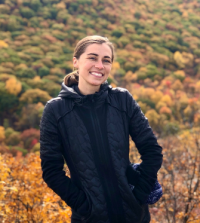
Meg Gould ’21 J.D. is dedicated to advocating for access to justice and human rights in the United States and abroad. At Columbia, Meg served as co-president of Rightslink, co-chair of the International Refugee Assistance Project, outreach chair for the Human Rights Institute 1L Advocates Program, a Human Rights Law Review staff member, and a staffer and executive editor for the Jailhouse Lawyers Manual. She was also a member of the Frederick Douglass Moot Court team and co-led the Rightslink caravan to Beirut, Lebanon. During her 1L year, Meg was awarded the Davis Polk Leadership Fellowship, allowing her to co-found the Paralegal Pathways Initiative, which connects formerly incarcerated individuals with employment opportunities in the legal field. As a student in the Human Rights Clinic, Meg engaged in legal advocacy to promote transitional justice in the Central African Republic. As a law student, Meg also worked with AdvocAid—Sierra Leone, the International Legal Foundation, the Maryland Federal Defenders, the Bronx Defenders, and the Office of the Legal Adviser for the State Department. Meg was a James Kent Scholar, Harlan Fiske Stone Scholar, and a 2021 winner of the Jane Marks Murphy Prize. She will clerk on the U.S. District Court in Western Tennessee after graduation, followed by a U.S. Court of Appeals for the 6th Circuit clerkship
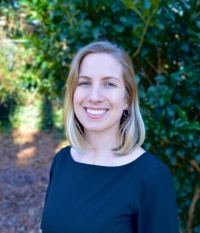
Meghan Lucas ’21 J.D. is devoted to challenging employment practices that disproportionately exploit workers based on race and legal status. Starting with her time as a Human Rights Institute 1L Advocate, Meghan sought out strategies to advance economic rights, learning from international human rights and domestic public interest communities. As a student in the Community Advocacy Lab Clinic, Meghan advanced legislative reforms at the intersection of racial and economic justice. She was an active member of the National Lawyers Guild and served as the vice-president and policy chair of the Society for Immigrant and Refugee Rights (SIRR). Meghan participated in the SIRR immigration law moot court and spent her law school summers working on asylum issues, including labor trafficking and removal defense. As a 3L, she helped workers obtain unemployment benefits after losing jobs due to COVID-19. Following graduation, Meghan will continue to support low-wage workers’ rights at the Charlotte Center for Legal Advocacy in North Carolina, as an Equal Justice Works Fellow.

Rosario Grimà Algora ’21 LL.M. came to Columbia Law School as a human rights fellow. Prior to law school, she focused on women’s human rights and refugee rights through work in domestic NGOs, and international organizations. At Columbia, Rosario charted a towards a Ph.D., examining the theoretical underpinnings of human rights, and she also developed a reading group with Professor Sanger on Meaning of Motherhood. Grimà Algora developed a paper on reproductive rights in Latin America, which she presented at Columbia Human Rights Institute Paper Symposium, and which was awarded the honor of best human rights essay from the Institute of Studies of Human Rights. Marrying theory and practice, Rosario worked with a team of students to develop a racial justice campaign on the issue of social holds, a project that is ongoing with Professor Katherine Franke. Rosario also participated in several student organizations and coordinated a group on migration and refugees. After Columbia, she plans to prioritize gender issues, particularly sexual and reproductive rights, as a recipient of the Columbia Law School Global Public Service Fellowship. Rosario will be a research assistant for the Center for Gender & Sexuality Law Equal Rights Project, with Professor Franke and Ting Ting Cheng.
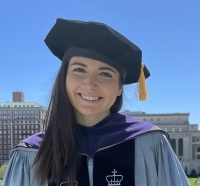
Shannon Marcoux ’21 J.D. is pursuing a career at the intersection of human rights and environmental justice. While at Columbia, Shannon had several leadership roles, including coordinator for the Human Rights Institute 1L Advocates Program, advocacy co-president of the Student Public Interest Network, research chair for Rightslink, environmental law moot court program coach, and a member of the Human Rights Institute Student Advisory Committee. As a student in the Human Rights Clinic, Shannon worked on a team conducting research and advocacy to advance the right to education in Kashmir. Shannon spent her summers working with Natural Justice, EarthRights International, and Dejusticia, she also interned with Human Rights Watch, the Columbia Center on Sustainable Investment, and the Center for Constitutional Rights, and worked with LGBTQ+ asylum seekers. Shannon is currently an advisor for the International Center for Advocates Against Discrimination. Her research on the human rights impacts of U.S. military presence and weapons testing in the Marshall Islands has been published in Columbia Human Rights Law Review Online and Environmental Claims Journal, and she presented this research at the Human Rights Institute Paper Symposium in 2020. Shannon served as an articles editor for the Columbia Human Rights Law Review and was a Harlan Fiske Stone Scholar and Dean’s Honors recipient. After graduation, Shannon will return to Natural Justice as a Leebron Fellow, focused on climate justice and human rights.
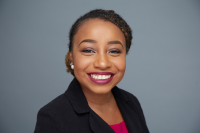
Udodilim (U.d.) Nnamdi ’21 J.D. advanced human rights at Columbia while also pursuing an LL.M. in International Criminal law at the University of Amsterdam. As a 1L, U.d. participated in the Human Rights Advocates Program and European Law Moot Court team. As a Davis Polk Leadership Fellow, she developed pathways to diversify the international human rights field. U.d. spent her 1L summer working for Philip Alston, the former UN Special Rapporteur on Extreme Poverty and Human Rights, and supporting grassroots, African women-led organizations in Ghana, Zimbabwe, and Cameroon through Columbia University Earth Institute’s Women, Peace, & Security Program. During her time at Columbia, U.d. was selected as a SIPA International Fellow and served as Teaching Assistant for Prof. Sarah Cleveland’s Transnational Litigation 1L seminar, a staff editor for the Human Rights Law Review, the public interest chair of Columbia’s Society for International Law, the co-president of RightsLink, and the Black Law Student Association’s international service trip chair. During her year in the Human Rights Clinic, U.d. worked on the Central African Republic war crimes accountability project. U.d. penned a thesis on police brutality against Black Americans as genocide in her 3L year. As a summer associate, U.d. worked at Cohen Milstein, bringing civil and human rights class actions, and at Foley Hoag, focusing on public international law in international courts and tribunals. During Law School, U.d. also interned at both the Center for Constitutional Rights and the Center for Justice & Accountability, focused on domestic human rights litigation. U.d. was a co-lead in the effort to secure Columbia Law School’s inaugural anti-racism grant to strengthen the Law School’s focus on global racial justice issues, increase diversity, and expand opportunities for Law School students to work in sub-Saharan Africa.
2020 Award Recipients
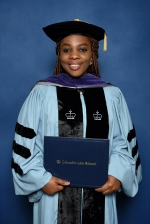
Bamisope Adeyanju ’20 LL.M. was a Human Rights Fellow, a Harlan Fiske Stone Scholar, a Baker Mckenzie scholarship recipient, and a Parker School Certificate for Achievement in International Law awardee. Prior to joining Columbia Law School, she utilized human rights and open society legislation to ensure accountability for economic and social rights violations in Nigeria. As a member of the Human Rights Clinic, she worked with the Racial Justice and Economic and Social Rights in the U.S. Project team to advance the rights of rural communities to adequate and affordable sanitation. Adenyanju’s work was instrumental to the team’s submission of a shadow report to the UN Human Rights Council ahead of the U.S. Universal Periodic Review. She also engaged the Inter-American Commission on Human Rights through its Special Rapporteur on environmental rights and drafted a thematic hearing request on sanitation for onward submission to the Commission. Within the CLS community, Adeyanju served as editor of the American Review of International Arbitration Journal and is known for her uplifting support to other students while serving on multiple student organization boards like the Student Public Interest Network, Columbia Law Students for Disability Rights, and the Environmental Law Society. After graduation, she will work with the human rights organization, Accountability Counsel, in Washington, D.C., to promote corporate and institutional accountability and protect the human and environmental rights of communities harmed by internationally-financed projects.
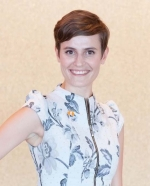
Zoe Bush '20 LL.M. came to Columbia Law School as a 2019 John Monash Scholar from Australia. During her time as a student, Bush served as a Student Senator, where she advocated for initiatives to reduce Columbia Law’s greenhouse gas emissions. As a student senator, she took incredible initiative in developing a guide for LL.M.s interested in human rights, and often put herself forward to serve as a mentor for other students. She drafted the revised Say Her Name report as Research Assistant to Professor Kimberlé Crenshaw, worked on campaigns to end the school-to-prison pipeline as an extern at the Center for Popular Democracy, advocated for improved public housing conditions in Red Hook, Brooklyn as part of the Community Advocacy Clinic, and assisted with teaching Lawyering for Change as Research Assistant to Professor Susan Sturm. Prior to joining Columbia Law, she worked with Australian Indigenous communities to develop criminal justice reforms for Indigenous peoples with Fetal Alcohol Spectrum Disorder, which have been adopted by the Australian Senate and Amnesty International. Bush will spend the summer gaining experience in movement lawyering as an LL.M. Public Interest Fellow at Law for Black Lives.
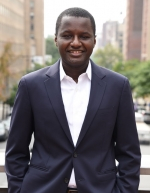
Ibrahim Diallo ’20 J.D. arrived at Columbia Law School committed to pursuing a public interest legal career. His work at the Law School has primarily focused on building a social justice community amongst students and faculty and developing relationships between the Law School and the greater New York City community. During his 2L year, he was awarded the Columbia Law School Davis Polk Leadership Fellowship. As part of the fellowship, he organized Columbia law students to get involved in the New York City taxi workers labor movement. In addition to ongoing pro bono projects, Diallo helped establish an externship program between the Law School and the New York Taxi Workers Alliance. As part of his exemplary leadership on campus and mentorship to other students, he served as the Social Consciousness Chair of the Black Law Students Association (BLSA), where he spearheaded a number of new initiatives aimed at engaging Columbia law students in social justice issues. Such initiatives include instituting CLS’s first-ever summer reading program for incoming students; fostering dialogues on domestic human rights with speakers such as Jackson, Mississippi’s Mayor Chokwe Antar Lumumba, and activist and human rights attorney, Nkechi Taifa. Lastly, he served on the editorial board of the Columbia Journal of Race and Law. This summer, Diallo will begin his legal career as a Staff Attorney at the New York Taxi Workers’ Alliance.
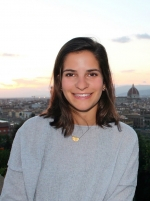
Emma DiNapoli ’20 J.D. has led efforts to strengthen human rights opportunities for students throughout her time at Columbia Law School. DiNapoli served as co-president of Rightslink and Columbia Law Students for Palestine; advocacy co-chair for Columbia Law Students for Palestine; pro bono co-chair for the Society of Immigrant and Refugee Rights; and as the community chair for the Human Rights 1L Advocates Program. She participated in a spring break caravan to Sarajevo, Bosnia as a 1L, and co-lead a caravan to Palestine the following year. As a student in the Human Rights Clinic, she was an inaugural member of a project on disruptions to higher education in Kashmir. She also interned with Human Rights Watch in its International Justice Program, ALEF in Beirut, Lebanon (where she documented the forced eviction of Syrian refugees), and REDRESS in its office in the Netherlands. DiNapoli spent 3L fall in Washington, D.C. with the State Department. She presented her research on reconstruction in Syria at the Salzburg Global Cutler Law Program and the Human Rights Institute Paper Symposium, and published an article on this topic in the Human Rights Law Review. She worked as a research assistant on several projects with Human Rights Institute faculty, co-taught a class on human rights at Barnard College, and provided research assistance to the Syrian Legal Development Programme, the International Senior Lawyers Project, and Immigration Equality, among other organizations. DiNapoli was a James Kent Scholar, Harlan Fiske Stone Scholar, a graduate fellow with the Advanced Consortium on Cooperation, Conflict, and Complexity (AC4), and the 2020 winner of the Edwin Parker Prize. She will work as a Leebron Fellow with REDRESS in London and Sudan after graduation.
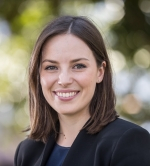
Alice Gardoll ’20 LL.M. came to Columbia as a Fulbright Scholar from Australia, where she advocated for refugee rights and the rights of Aboriginal Australians living in the remote Northern Territory. At Columbia Law School, Gardoll devoted her time both in and outside of the classroom to human rights and racial justice work. She helped to prepare briefs defending the rights of persons on death row through Columbia’s Capital Post-Conviction Defense Practicum. As a member of Professors Bernard Harcourt and Alexis Hoag’s Abolition: A Social Justice Practicum, she engaged in an innovative effort to reimagine a criminal justice system no longer based on punitive punishment. She also participated in research to advance the global protection of journalists and media freedom, as part of a team assisting Professors Amal Clooney and Sarah Cleveland. In the CLS community, she was known for her benevolent encouragement and support to other students in her position as LL.M. Board Representative for the Student Public Interest Network. Gardoll will be continuing her commitment to human rights work as an LL.M. Public Interest and Government Fellow with Reprieve.
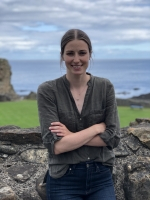
Libby McAvoy ’20 J.D. is dedicated to advancing rights-based accountability and justice, motivating solidarity practices in investigation and documentation, and fostering a sense of genuine camaraderie in the work, beginning with her first semester as a Human Rights Institute 1L Advocate. While serving as the Rightslink events chair, McAvoy organized the inaugural Human Rights Week series in coordination with the Human Rights Institute. She also worked first as a research assistant, then as a clinic student and, finally, as a member of the advanced clinic—all with the Project on War Crimes in the Central African Republic. McAvoy was awarded the Irell and Manella Prize for outstanding leadership and good citizenship for her projects through the Society for Immigrant and Refugee Rights, of which she was co-president. Throughout her time at the law school, McAvoy has also dedicated herself to pro bono work, including with the International Refugee Assistance Project, Lenox Hill Neighborhood House, Vaša Prava, and WITNESS. For WITNESS, McAvoy drafted a forthcoming guide on the documentation of sexual and gender-based violence. McAvoy is a James Kent Scholar, a recipient of the Parker School Recognition of Achievement in International Law, and a recipient of the J.D. Public Interest and Government Fellowship. Following graduation, McAvoy will work to harness open-source and visual evidence for accountability and justice as a legal fellow with WITNESS and Syrian Archive (Mnemonic).
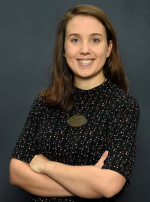
Amanda McNally '20 J.D. served as both a role model and mentor to the CLS human rights community. She first joined the community as an HRI 1L advocate, and later became co-president of Rightslink and special features editor of the Columbia Journal of Race and Law. During her time at Columbia, she worked to promote resilience in human rights work as a research assistant with Sarah Knuckey. McNally also spent two years in the Human Rights Clinic, partnering with the Sana'a Center for Strategic Studies on a project on mental health and the psychological impacts of war on individuals, families, and communities in Yemen. As a member of the Human Rights Clinic's Wellbeing Working Group, she was dedicated to building crucial and self-reflective conversations on campus and advocated on behalf of other students for more livable summer funding policies for public interest students. Prior to law school, she obtained a graduate degree in Forced Migration and Refugee Studies, and conducted psychosocial and child protection work with unaccompanied migrant children in Egypt and South Sudan.
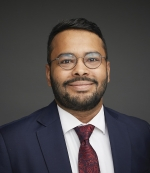
Mihir Samson ’20 LL.M. has worked as a lawyer in India for nine years, focusing on the rights of LGBTQIA persons, public health, and civil liberties. He brought with him extensive experience from his work on the challenge to the anti-sodomy law in India and the legal recognition of transgender persons. During his time at Columbia Law School, Samson was a source of inspiration to his fellow peers. He developed a project to improve LGBTQIA diversity at the Indian bar as a Davis Polk Leadership Fellow and helped organize two protests against the India Citizenship Amendment Act involving students and faculty from across Columbia University. Samson was involved in organizing law students, formerly incarcerated individuals, and artists, to create a performance on incarceration, criminal law, and civic participation. He was a Harlan Fiske Stone Scholar and a recipient of the LL.M. Public Interest Fellowship. As a part of the Fellowship, he will work with the YP Foundation in New Delhi, focusing on strengthening the rights of transgender persons, and confronting recent legal and administrative hurdles to the right of self-identification.
2019 Award Recipients
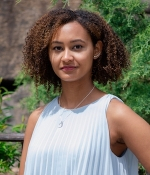
Brittany Davis ‘19 J.D. devoted her time at Columbia Law School (CLS) to advancing human rights causes both on campus and in the broader community. As a student at the Human Rights Clinic, she worked closely with the Clinic’s partner organizations in the Central African Republic (CAR) on a number of projects, including advocacy efforts during the country’s Universal Periodic Review at the United Nations in Geneva, and co-facilitation of a legal reform workshop. She also led the law school’s student organization Rightslink as Co-President and was instrumental in developing the Human Rights Institute’s 1L Advocates Program. During her second year, she was a Douglass Fellow at the Human Trafficking Institute and ran the Global Initiative against Gendered Violence (through her 3rd year). As a 3L, Davis chaired the student management team leading the Human Rights Institute (HRI) 1L Advocate Program and led the Global Initiative Against Gender Violence. Through these roles, she sponsored a series of events and trainings, which included hosting former Vice President Joe Biden at CLS.
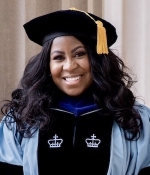
Sijuwade Falade ’19 J.D. is committed to supporting groups and movements to tackle such problems as human trafficking, police brutality, and institutional discrimination and injustice fueled by racism, misogyny, and xenophobia. At CLS, she was a leader of several student organizations including Rightslink, the Black Law Students Association, and the Law in Africa Association. Through these positions, she engaged in planning social justice events and providing and coordinating mentorship opportunities. Falade was also involved in the Human Rights Clinic as a 1L volunteer and 2L student. She supported the Clinic’s projects by strengthening forensic investigations of war crimes in the Central African Republic and challenging the criminalization of human rights defenders in Peru. She was also an intern with Advocates for Community Alternatives in Ghana, supporting community-led development and challenging harmful business practices. Falade was awarded the Leebron Fellowship for her continued commitment to human rights, and will spend the coming year working with the United Nations High Commissioner for Refugees in Kenya, where she will launch her career promoting women and children’s rights and gender equality and combating sexual- and gender-based violence and trafficking within the African context.
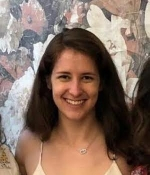
When Abigail Gotter ‘19 J.D. arrived at CLS, she already had experience working with international human rights NGOs and an interest in exploring how to promote and protect human rights while respecting culture and identity. She joined the CLS human rights community as a 1L volunteer with Rightslink’s Research and Advocacy Program, and contributed to several of HRI’s Human Rights in the U.S. Project initiatives, including a report on Cities for CEDAW - the international Women’s rights convention -, and research on best practices in addressing discrimination and xenophobia in collaboration with U.S. State and local agencies. During her time at CLS, Gotter interned with Women Enabled International and Human Rights Watch. She was a Harlan Fiske Stone and James Kent Scholar and served as a Managing Editor on the Columbia Law Review. As a student in the Human Rights Clinic, Gotter demonstrated leadership, a strong work ethic, and a commitment to constantly learning and growing. As a 3L, she contributed to advancing gender justice in Papua New Guinea and in New York City, furthering her contribution to advancing human rights.
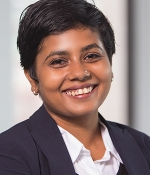
Darshana Mitra ’19 LL.M. was a source of inspiration and support to the CLS human rights community. Focusing her legal work on supporting disenfranchised and marginalized groups, she brought to Columbia a wealth experience and insight from working as a human rights lawyer in India for six years, representing survivors of gender-based and sexual violence and immigrant populations navigating the complex legal and bureaucratic structures governing immigration and workers’ rights. Over the course of her LL.M. year at CLS, Mitra was instrumental in supporting the Human Rights Clinic's work to document the mental health consequences of armed conflict in Yemen and advocate for improvements in the right to education in Kashmir. She also presented on concerns about Yemen’s human rights record at the United Nations in Geneva, spoke at the Leitner Center at Fordham, and moderated a film screening on the forced statelessness of millions of people in Assam, India. She also contributed to organizing solidarity events for human rights violations in South Asia while in New York.
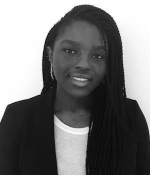
Oyinkansola Muraina ’19 J.D. is a fierce advocate for business and human rights, racial justice, and sustainable development. She worked tirelessly with the Human Rights Clinic to support activists in Papua New Guinea and Peru resisting the negative social and environmental impacts of large gold mining operations. Muraina worked in Uganda with the Foundation for Human Rights Initiative following her first year at the law school, exploring the impact of poverty on access to adequate legal representation. She was President of the Law in Africa Student Society, organized reading groups on contemporary legal issues in Africa, and interned with the Open Society Justice Initiatives, where she supported a broad array of legal cases. She was instrumental in the mentorship of dozens of students from underprivileged backgrounds and actively promoted social justice and human rights throughout her three years at CLS.

Before joining CLS, Vincent Wan Shun Wong ’19 LL.M. was a Staff Lawyer in Toronto for the Chinese and Southeast Asian Legal Clinic. Born in Hong Kong and raised in Canada, he provided free legal services to low-income members of Ontario’s Chinese, Vietnamese, Cambodian, and Laotian communities who don’t speak English and often experience racism, criminalization, and mental health issues. After joining CLS and through the Human Rights Clinic, Wong worked in partnership with a range of stakeholders in Kashmir to advance the right to education in the region. During his LL.M year, he also played a key role in curating two public programs on the internment of Uyghurs and other Muslim populations in China, and on Asian Americans and Affirmative Action in the U.S. He also presented on issues related to migrant sex workers in Canada and civil society’s access to human rights treaty bodies, and served on HRI’s Student Advisory Committee. After graduation, Wong plans to focus on advancing scholarship on the intersection between critical race theory, immigration and citizenship law, and undocumented populations in Canada.
2018 Award Recipients
Kate Berry ’18 J.D. led efforts to strengthen and grow human rights opportunities at Columbia Law School. As a student in the Human Rights Clinic, Berry championed issues related to human rights during armed conflict, particularly the right to mental health. Her advocacy for the mental health of Yemenis during the on-going conflict included testimony to the U.S. Senate following the first immigration ban by the Trump Administration. In her 3L year, Kate returned as an Advanced Clinic Student, coordinating the Research and Advocacy Program, co-developing the Human Rights Institute 1L Advocates Program, and developing a unique teamwork initiative. Outside of the Clinic, Berry served as a Notes and Submissions Editor for the Columbia Human Rights Law Review (HRLR) and Co-Chair of Research for Rightslink. Berry supported the Human Rights Institute as a member of the Student Advisory Committee (SAC) and co-founded the Trump Human Rights Tracker to monitor potential and ongoing rights violations by the administration. While at Columbia, Berry was a Tony Patino Fellow and a Harlan Fiske Stone Scholar. Following graduation, she will work in technology and privacy law at a law firm in Seattle, her hometown.
Jacob Bogart ’18 J.D. has worked to strengthen human rights opportunities for students throughout his time at Columbia Law School. He co-founded and directed the Human Rights Institute 1L Advocates Program, an initiative that provided 37 first year law students with mentorship, training, and research opportunities; served as co-president and co-research chair of Rightslink; and was an advocacy co-chair of the Student Public Interest Network. Bogart participated in the European Law Moot Court competition and served on the Human Rights Institute Student Advisory Committee for two years. He was an Articles Editor for the Columbia Human Rights Law Review, and he led a spring break pro bono caravan to Bosnia to volunteer with a legal aid clinic. While at Columbia Law School, Bogart focused his studies on international human rights law, international law, and the United Nations. He was a member of the Human Rights Clinic, where he worked on a project related to war crimes in the Central African Republic, traveling there twice to participate in an investigation and exhumation. He interned with the Legal Defense and Assistance Project in Lagos, Nigeria and twice with Human Rights Watch in their United Nations Advocacy Division and with Reed Brody. He also worked as a consultant with the Open Society Justice Initiative, provided research assistance to Professor Sarah Cleveland at the Human Rights Committee, and was a teaching assistant for Professors Harcourt, Cleveland, and Martin. Jacob presented his research at the Salzburg Global Cutler Law Program, the Human Rights Institute Student Paper Symposium, and a conference on disability rights in London. He was a Public Interest Fellow, a James Kent Scholar, a Phi Kappa Phi Yeakel Endowed Fellow, and is Global Public Interest Fellow, through which he will work with Fortify Rights in Bangkok, Thailand as a researcher.
Yasmin Dagne ’18 J.D. was the Academic Chair for the Black Law Students Association (BLSA), an Articles Editor on the Columbia Law Review, and a member of the Frederick Douglass Moot Court team, as well as a Harlan Fiske Stone Scholar during her studies at Columbia Law School. As a member of the Human Rights Clinic, Dagne worked on a war crimes investigation of international peacekeepers in the Central African Republic. She also worked on challenges to an Alabama voter identification law and a Texas immigration law. Next year, she will work at Human Rights Watch as the Leonard H. Sandler Fellow. Dagne was selected to receive the Human Rights Institute Commendation for Leadership and Commitment in Human Rights because of her commitment to fighting injustice and advancing human rights in every space within which she worked. From her work investigating war crimes in the Central African Republic, to her leadership within BLSA and the Columbia Law Review, she has made essential contributions to furthering human rights and social justice. Additionally, her mentorship and support to underrepresented students interested in public interest make her an inspiration to students of color at CLS.
Marryum Kahloon ’18 LL.M. attended Columbia as a 2017-2018 Fulbright Scholar from Australia. During her time at the law school she focused her studies on international law and human rights related courses. As a member of the Human Rights Clinic, she worked on a project in the Central African Republic (CAR). Under the mentorship of Professor Knuckey and Legal Fellow Anjli Parrin, she organized a law reform workshop in CAR, drafted a provision around forensics for a hybrid court, supported youth activists in documenting human rights abuses, and ensured representation of NGOs from CAR in the country's Universal Periodic Review at the United Nations in Geneva. She also interned in Human Rights Watch's International Justice Team and provided pro bono support to the National Academies of Sciences Committee on Human Rights, drafting a complaint to UNESCO on behalf of a prisoner of conscience. Kahloon was awarded the Edwin Parker Prize for excellence in the study of international law and was named a James Kent Scholar. This Summer, she will continue to work with the Human Rights Clinic and will arrange consultations between diplomatic missions and national civil society organizations in CAR.
Rachel LaFortune ’18 J.D. has demonstrated an exceptional dedication to human rights and social justice during her time at Columbia Law School. She served as Co-President of Rightslink, founded Columbia Law Students for Palestine, and participated in the European Law Moot Court competition. She has focused her studies on international, comparative, and human rights law, and was a member of the Human Rights Clinic for two years, working on two projects, one addressing the impacts of an industrial-scale gold mine in Papua New Guinea on local indigenous communities, another addressing lack of access to sanitation for predominantly Black communities in rural Alabama. Rachel interned at Destination Justice in Cambodia, and with Human Rights Watch in Toronto, Canada. She was a James Kent Scholar, a recipient of the Parker School Recognition of Achievement in International Law, and a recipient of the David W. Leebron Fellowship. Through her Leebron Fellowship, she will be joining Amnesty International Canada's Indigenous advocacy team in Ottawa, where she will be working to promote Canada's compliance with the United Nations Declaration on the Rights of Indigenous Peoples.
2017 Award Recipients
Suraj Kandath Girijashanker ’17 LL.M. put incredible effort into promoting diversity and ensuring more complete representation of voice in the human rights field while at Columbia Law School. As a LL.M. Human Rights Fellow, his studies focused on international human rights law, international refugee law, and gender and sexuality law. As a member of the Human Rights Clinic, Suraj worked on the targeted killings and mental health in Yemen projects. As part of the targeted killings project, he worked on designing a media series for advocates from countries most affected by U.S. counterterrorism policies with the aim of contributing to future partnerships between advocates in the south and policymakers in the U.S. Suraj was a Harlan Fiske Stone Scholar and a recipient of the David W. Leebron Fellowship. Through his Leebron Fellowship, Suraj will be based with Outright Action International in New York and with the Arab Foundation for Freedoms and Equality in Beirut. As a fellow, he will document best practices for promoting the rights of LGBT people in the Middle East and North Africa by conducting interviews with regional human rights defenders, lawyers, government officials, lawmakers, and advocates.
Maria Emilia Mamberti ’17 LL.M. has demonstrated an exceptional dedication to human rights and social justice during her time at the law school. She was a LL.M. Human Rights Fellow, a 2016-2017 Fulbright Scholar, a member of the Human Rights Institute Student Advisory Committee (SAC), and a member of the Human Rights Clinic. In her role on the SAC, Maria surveyed LL.M. students’ interests in human rights to better inform programming at the law school. Through the Clinic, she worked on the human rights in the U.S. team, advancing arguments to incorporate international human rights law in advocacy actions taking place in different states in the U.S., with a focus on anti-discrimination protections. Her studies at Columbia Law School focused on international human rights, constitutional law, social and economic rights, and freedom of information. Maria was a recipient of the Philanthropic Educational Organization scholarship, which seeks to advance women’s leadership and higher education worldwide, and was a James Kent Scholar. She interned with the Knight First Amendment Institute and served as a research assistant for Human Rights Institute faculty co-director Sarah Cleveland. Maria will continue to intern with the Knight First Amendment institute over the summer before returning to Argentina to co-found a human rights NGO in her hometown of La Plata.
Anjli Parrin ’17 J.D. has worked to advance human rights and promote diversity and inclusion efforts while at Columbia Law School. As President of the Law in Africa Student Society she founded a pro-bono program with Amnesty International monitoring extra-judicial killings in Kenya, and created a reading group about contemporary legal issues on the continent. Anjli served as Editor-in-Chief of the Columbia Journal of Transnational Law and published her legal note on mapping a legal framework for terrorism defectors and detainees in Somalia. She has focused her studies on international, comparative, and human rights law, and was a member of the Human Rights Clinic for two years, working on a project to investigate war crimes in the Central African Republic (CAR), and advocate against discrimination in higher education in CAR. Together with colleagues and faculty, Anjli created the Trump Human Rights Tracker, to monitor potential and ongoing rights violations by the new administration. She participated in both the European Law Moot Court Competition and the Jean-Pictet Competition in International Humanitarian Law, which she also coached, and was a student representative on the Faculty Curriculum Committee, and Leadership Development Taskforce. Anjli was awarded the David M. Berger Memorial Prize, the Clinical Legal Education Association Outstanding Student Prize, the Salzburg-Cutler Fellowship, the SIPA International Fellowship, and was a Harlan Fiske Stone Scholar. In the fall, she will begin as a legal fellow with the Columbia Law School Human Rights Clinic and the Argentine Forensic Anthropology Team, working on a project on using forensic sciences and human rights to advance accountability for mass atrocities in CAR.
While at Columbia Law School, Ria Singh Sawhney ’17 LL.M., was dedicated to social justice and committed to strengthening human rights opportunities. Ria was on the research board of Rightslink and a board member of the ACLU and Queer Trans People of Color student groups. She was a LL.M. Human Rights Fellow, a Harlan Fiske Stone scholar, and recipient of the Parker School Recognition of Achievement in International Law. Her studies focused on economic and social rights, accountability for counter-terrorism practices, mental health and human rights, social movements lawyering, and the intersection of technology and human rights. As a member of the Human Rights Clinic, Ria worked on a project focused on increasing accountability for drone strikes and targeted killings, and on the right to mental health in Yemen. Ria will join the Center for Human Rights and Global Justice at NYU as a research fellow. She will also continue her work with the right to food movement in India.
Julia Sherman ’17 J.D. has been a leader in strengthening the human rights community at Columbia Law School. She served as Editor-in-Chief of the Columbia Human Rights Law Review and President of the National Security Law Society. She was also an Events Chair for Rightslink and was on the Native American Law Student Association Moot Court team. Her studies focused on international law, international criminal law and national security, and international humanitarian law. She interned at the International Criminal Tribunal for the former Yugoslavia, the Permanent Mission of the Federated States of Micronesia, HIAS Uganda, and Human Rights Watch, and also served as a research assistant for Human Rights Institute senior fellow Amal Clooney and Dr. Agnes Callamard, Special Rapporteur on Extrajudicial, Summary or Arbitrary Executions. Julia received the Parker Fellowship at the International Court of Justice for 2017-2018, the David M. Berger Memorial Prize at graduation, and was a Harlan Fiske Stone and James Kent Scholar. Through the Parker Fellowship, she will undertake a traineeship at the International Court of Justice in The Hague.
While a LL.M. Human Rights Fellow at Columbia Law School, Netsanet Tesfay ’17 LL.M., focused on transitional justice, labor, and migration issues. She was part of the human rights clinic and worked with forensic anthropologists and judicial actors to address human rights violations and war crimes in CAR. Netsanet was also a teaching assistant for Professor Ssekandi’s class “African Legal Theory, Law and Development,” as well as an LL.M. representative for the Law in African Student Society. She co-authored an article with Professor Ssekandi on the International Criminal Court’s role in Africa, which is forthcoming in Georgetown’s Journal of International Affairs. In addition to her studies, she also continued to support the work of the Black Women’s Blueprint, focusing on legal advocacy with the United Nations and other international forums to address sexual and other forms of gender-based violence against black women and girls in the U.S. Next, as a fellow at Columbia’s Center for Sustainable Investment, she will conduct research on solutions for overcoming specific obstacles related to legal support gaps and transparency in the context of land-based investments.
Martin Willner ’17 J.D. worked to expand student opportunities in the field of international humanitarian law, particularly through his commitment to the Jean-Pictet Competition. As a first-year student, he reached the semi-final round of competition as part of Columbia's first team to participate. He coached two subsequent teams and worked to institutionalize support at Columbia Law School for the study and training of international humanitarian law through the competition. Throughout his third year, Martin assisted Human Rights Institute faculty co-director Sarah Cleveland with her work on the Human Rights Committee in Geneva. He also served as Head Notes Editor of the Columbia Journal of Transnational Law, where he was awarded the Neil McDonell Memorial Prize for outstanding service to the journal. Martin has received the Holthusen-Schindler Fellowship, a PepsiCo Research Fellowship, and the Salzburg-Cutler Fellowship in International Law, which he was awarded for his note on the application of the International Court of Justice’s Specially Affected States Doctrine to international humanitarian law. He was a James Kent and Harlan Fiske Stone Scholar and was awarded the David M. Berger Memorial Prize for his commitment to international law and world peace. In September, he will begin clerking at the Constitutional Court of South Africa for Justice Edwin Cameron.
2016 Award Recipients
Candy Ofime ’17 JD was co-founder and co-president of the Society of Law and Ethics and served as co-president of Rightslink. She was a staffer on the Columbia Journal of European Law, and a member of the Black Law Students Association, the Latino/a Law Student Association, the Empowering Women of Color Student Group, and the Columbia Society for International Law (CSIL). During her time at the law school, Ofime concentrated on international human rights law and advocacy, including on both business and human rights, and human rights in armed conflict. As a member of the Human Rights Clinic, Ofime conducted research in support of an indigenous community living around an industrial gold mine in the highlands of Papua New Guinea and to advance the right to water. She deepened her understanding of international humanitarian law while participating in the Columbia Law School Human Rights Internship Program in the occupied Palestinian territories. As a research assistant with Professor Amal Clooney, she researched the right to assistance of counsel in criminal proceedings under international law. Ofime will complete her final year of law school in Paris, France.
Naomi Prodeau ’17 JD was a member of Rightslink and the Columbia Society for International Law (CSIL), and a staff member of the Human Rights Law Review Jailhouse Lawyer’s Manual. Her academic interests include the constitutional right to basic education, land rights, refugee resettlement, and the right to bodily integrity and the prohibition against torture. Prodeau traveled to Amman, Jordan to work with the International Refugee Assistance Project, and to the Legal Resources Centre in Grahamstown, South Africa. Prodeau also examined the right to a fair trial in international jurisprudence as a research assistant for Professor Amal Clooney. With the Human Rights Clinic, she conducted work on U.S. counter-terrorism policies and practices, and the use of drones for targeted killing. In the summer of 2016, as a research assistant to Professor Sarah Knuckey, she traveled to the Central African Republic for a project on forensic anthropology and mass graves. She further conducted extensive legal research for the re-drafting of the new Minnesota Protocol, a UN manual on the investigation of unlawful killings. Prodeau was a recipient of the John Bainbridge Fellowship for her work in South Africa, and is a 2016 Harlan Fiske Stone scholar. Next year, she will continue to pursue her work with the Human Rights Clinic, serve as a research assistant for Professor Sarah Cleveland, act as an Article Editor for the Jailhouse Lawyer’s Manual and serve as a board member of the Human Rights Law Review. She is completing her degree at the Sorbonne in France.
Gulika Reddy ’16 LL.M focused her Columbia Law School studies on human rights, development, advocacy, and gender justice as a 2015-2016 Human Rights LL.M Fellow. She was a member of the Human Rights Clinic, where she contributed to a project in Papua New Guinea, addressing the right to remedy for victims of sexual violence and the right to water. In fall 2016, Reddy will join the Dubin Fellows Program for Emerging Leaders at the Harvard Kennedy School, where she will focus on gender and education policy in India. Reddy will continue her work as founder and director of her non-profit Schools of Equality.
Ryan Santicola ’16 LL.M was named a Columbia Law School James Kent Scholar in recognition of outstanding academic achievement, and was awarded the 2016 Parker School Certificate for his accomplishments in international and comparative law. He focused his LL.M on international law, with a particular interest in the intersection between international humanitarian law and human rights. He examined the investigation of civilian casualties resulting from the use of military force outside of areas of active hostilities through supervised research, and provided research assistance on the use of military force for Professor Sarah Knuckey. Santicola further provided research assistant to Professor Amal Clooney on the right to a fair trial in international law. While pursuing his LL.M, Santicola joined the United States Naval War College's International Law Studies journal as an Associate Editor. Next year, he will resume his active duty military service as a Judge Advocate in the U.S. Navy, mentoring and assessing fellow Judge Advocates on the application of international humanitarian law and the law of the sea.
2015 Award Recipients
During her time at Columbia Law School, Alison Borochoff-Porte ’15 significantly contributed to the expansion of human rights opportunities for other students, including during her co-presidency of the student group Rightslink. She explored the intersection of human rights, health, and environmental justice as a Human Rights Internship Fellow, travelled to China as an Oldham Fellow where she focused on Chinese immigration law, and was a member of the Human Rights Clinic where she co-led research on the human rights impacts of mining in Papua New Guinea. This past year, Borochoff-Porte also served as executive managing director of the Columbia Human Rights Law Review. After graduating, she will be joining EarthRights International in Thailand as a Leebron Fellow. Her work with EarthRights will focus on creating a framework of recommendations for communities affected by development and engaging corporate and government actors to discuss their views on environmental and social impact assessments of development projects.
Douglas Cantwell ’15 immersed himself in international law and human rights while at Columbia, and consistently demonstrated academic excellence. He served as the external president of the Columbia Society of International Law and was the Head Solicitations Editor for the Journal for Transnational Law in his 3L year. Cantwell expanded opportunities for all students to gain international human rights field experience through spring break caravans, including by organizing a highly successful 2014 trip to Myanmar to work with the organization Justice for All and by founding and coaching the International Criminal Court Moot Court in 2013-14. Cantwell also joined the Iraqi Refugee Assistance Project Spring Break Caravan in Ammam, Jordan during his 2L year. In 2013-14, Cantwell participated in the Human Rights Clinic where he worked on U.S. accountability for human rights and the human rights impacts of natural resource extraction projects in the Democratic Republic of the Congo. Next year, Cantwell will join the Navy Judge Advocate General (JAG) Corps, where he will work on issues of international humanitarian law.
Bassam Khawaja ’15 has made numerous invaluable contributions to human rights at Columbia, including through the Law School’s student-led Human Rights Working Group, which worked to deepen support for and expand opportunities on campus for students interested in becoming human rights lawyers. He has also advised and mentored many 1L and 2L students interested in pursuing human rights at Columbia. He excelled in his academic international and human rights law courses, and served as the Editor-in-Chief of the Columbia Human Rights Law Review in 2014-15, and, together with Borochoff-Porte, served as co-president of the student human rights group Rightslink in 2014-15. Khawaja interned with the U.N. High Commissioner for Refugees in Beirut, working to improve the process by which Syrians renew their residency with the Lebanese government, and also interned with Human Rights Watch in Beirut, to document human rights violations in Lebanon and Syria. This year, Khawaja traveled to Myanmar to conduct human rights trainings on using a human rights law framework to identify and respond to human rights abuses, and as a member of the Human Rights Clinic, Khawaja co-led a project aimed at improving transparency and accountability for U.S. drone strikes. Next year, Khawaja will be the Leonard H. Sandler Fellow at Human Rights Watch.
While at Columbia, Stephanie Persson ’15 took on leadership roles to expand human rights opportunities for students at Columbia, and frequently sought out opportunities to work in human rights, especially children’s rights and juvenile justice. She was often sought out as a mentor by other students, and dedicated herself to strengthening the student human rights community at Columbia. Persson worked as an intern with the Juvenile Rights Practice division at the Legal Aid Society in New York where she focused on child welfare and delinquency cases. She spent her 2L summer in Beijing, working with International Bridges to Justice where she researched Chinese criminal procedure law regarding juveniles. Persson was also selected as a Salzburg Culter Fellow based on strong academic performance and interest in international law. Persson was research chair for the student human rights group Rightslink, and was a member of the Human Rights Clinic, where she co-led work to monitor company responses to human rights violations. She was selected in 2015 to be the Greater China Public Interest Fellow, and after graduation, she will work in Hong Kong as a human rights lawyer.
